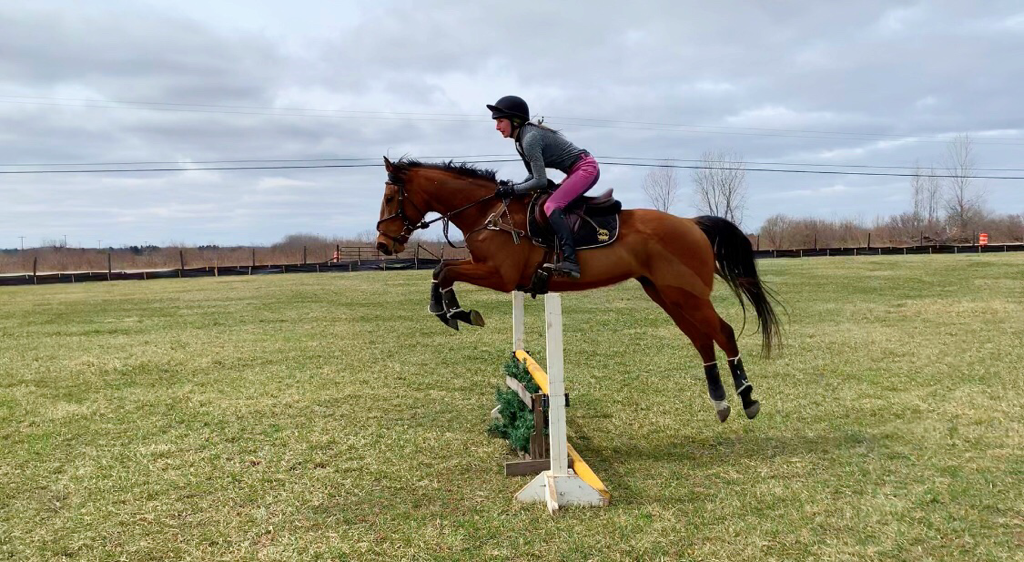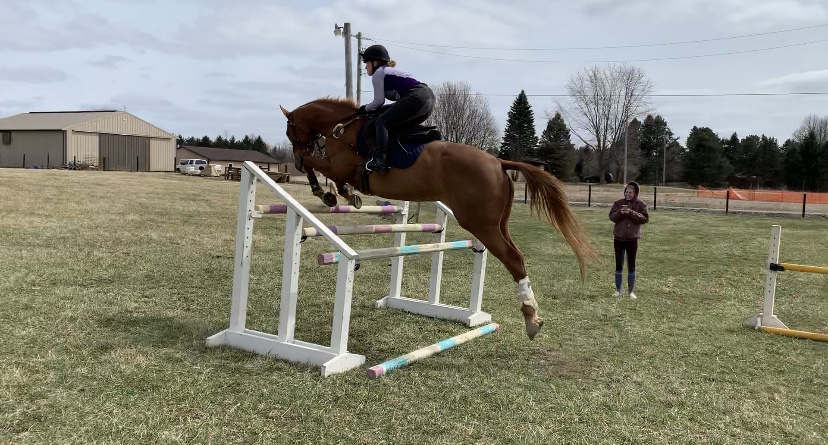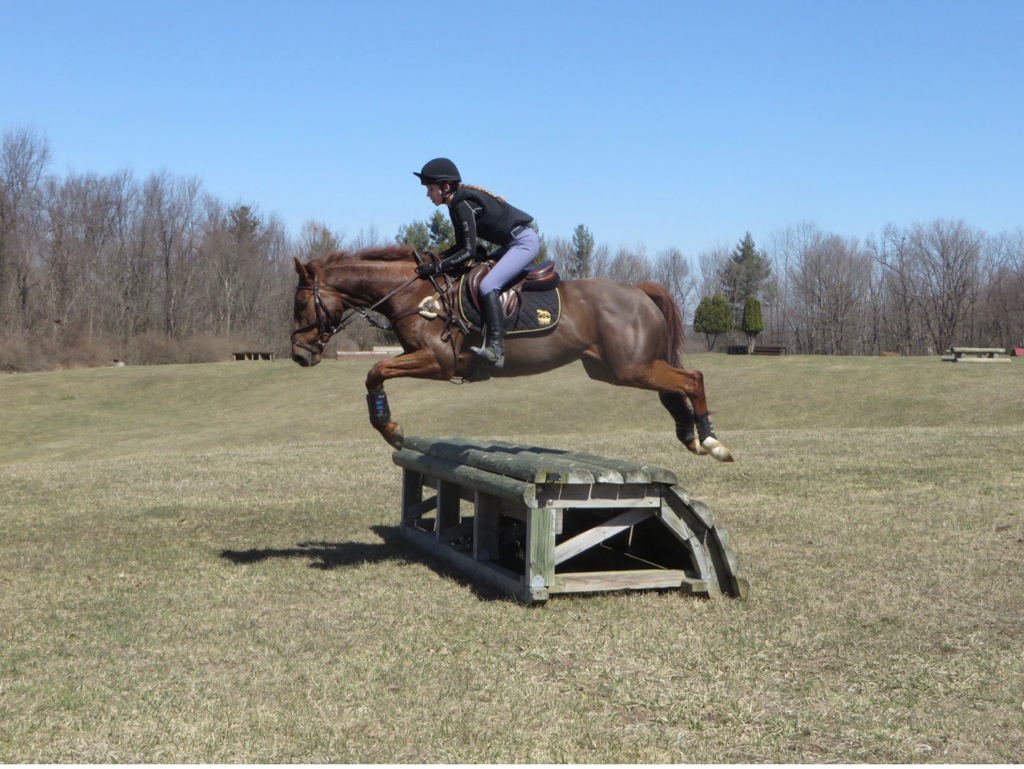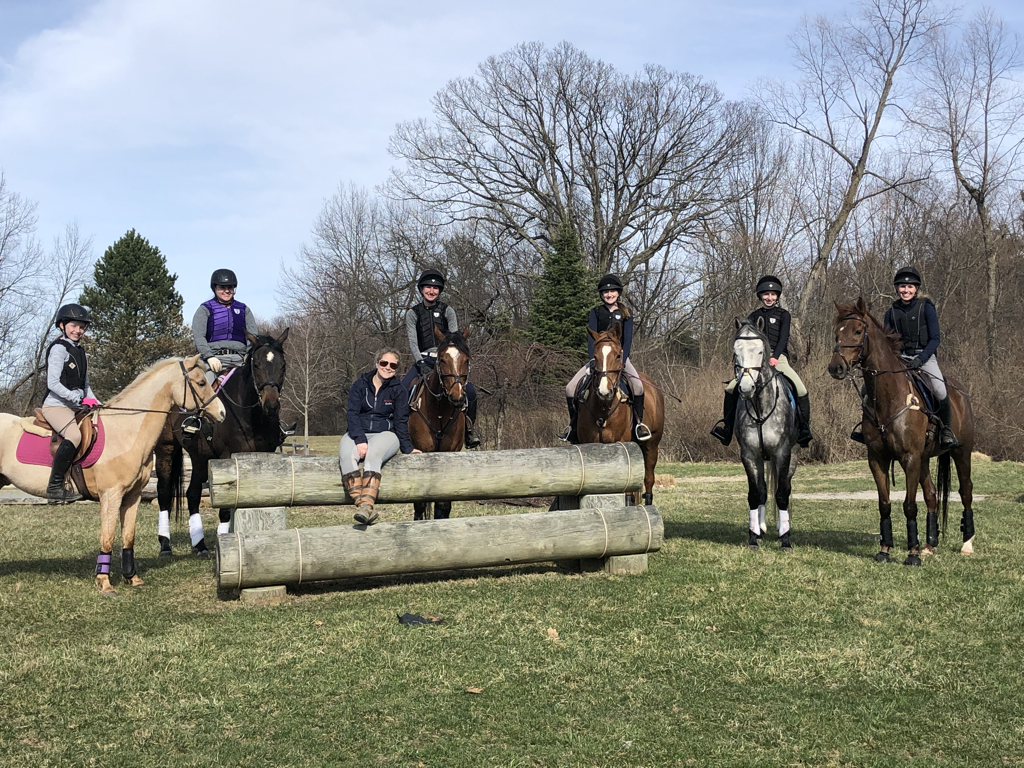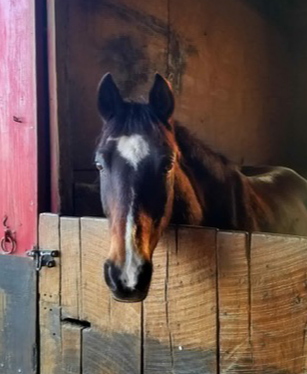2024 COMPETITION HANDBOOK
FOR STUDENTS & FAMILIES
2024 COMPETITION SCHEDULE & EXPECTATIONS
(tentative - check website calendar of events often for most current schedule)
RECOGNIZED EVENT TEAM:
These riders will compete primarily at USEA Recognized level events and must be
USEA members. www.useventing.com for more info on membership. All minors are
encouraged to join the USEA Area 8 Young Rider program and participate in US Pony
Club.
Scheduling: These riders are encouraged to take a minimum of 2 lessons per week from March through Sept. We recommend 4-6 recognized events per season or approximately 1 per month through the season, with schooling shows, clinics and xc schooling in between as needed to meet your goals.
Special Notes: Riders at this level should be leasing or own their own horse and own a
trunk with wheels for travel (I recommend black plastic tool trunks from Home Depot).
Horses competing at the recognized level need hind shoes and stud holes in their shoes (like cleats for soccer players). You will be responsible for front/hind shoes and stud holes in the shoes of any horse that is being competed at this level (approximately $70 every 5 weeks). Riders at this level will need to include XC schools at appropriate venues as part of their training plan.
Any rider competing at a USEA Event is required to contribute to a chiropractic adjustment for their competition horse prior to said USEA Event. Remember, we need to make sure our horses are able to perform to the best of their abilities.
Suggested Competitions - 1 USEA events per month…
TBD: ALL XC SCHOOLING OPPORTUNITIES
TBD: VISITING CLINICIANS
Show calendar to be determined in early spring….
SCHOOLING EVENT TEAM
These riders will compete primarily at the schooling level horse trials, intro
divisions at recognized events, and do clinics and xc schools as appropriate.
Scheduling: These riders are encouraged to take a minimum of 2 lessons per
week from March through Sept. I recommend 4-6 unrecognized events per season -which is approximately 1 per month through the season, with schooling shows, clinics and xc schooling in between as needed to meet your goals.
Special Notes: Riders at this level will want to have created a kit for showing (see
equipment page for full details) to include white saddle pad, arm band, jump vest
and other materials for the horse. You may want to get a black trunk w wheels to begin
to organize your rider for moving up in competitions and traveling to shows.
Riders at this level are encouraged to begin to participate in off grounds schooling
opportunities as appropriate.
Suggested Competitions…
TBD: ALL XC SCHOOLING OPPORTUNITIES
TBD: VISITING CLINICIANS
Show calendar to be determined in early spring….
LOCAL EVENT TEAM
These riders will be taking regular lessons, enjoy the summer riding program, other local venue shows.
Suggested Competitions…
TBD: ALL XC SCHOOLING OPPORTUNITIES
TBD: VISITING CLINICIANS
Show calendar to be determined in late winter/early spring….
MOVIN ON UP
All team members who are preparing to move up a level must come to at least one (3 encouraged) events at the level above to groom for a teammate to acquire hands on experience and understand the norms of that level of competition. Emily will talk to you about when we feel you are ready and help you plan your season, but also feel free to come to her with your questions and ideas too!
There are no shortcuts to success. Certain skills must be achieved at each level to
make the next one safe, successful and enjoyable. You should feel “ho hum” at each
level before you consider a move to the next one! You should be able to ride a dressage
test well for the level and be schooling movements of the next. In the jump phases, you
should feel really really comfortable in both phases at your level and be schooling the
next level or 2 up at home with confidence and enthusiasm.
OUR REGION - USEA Area 8: Michigan, Ohio, Indiana, Kentucky, Illinois.
OPENING DAYS, EVENT ENTRIES AND TRANSPORTATION OF YOUR
HORSE
Competition Binder will be kept at the front of the barn as of March 1st. Please check
often and let her know by signing up which shows, clinics and events you wish to enter.
Signing up ahead of the entry opening days allows Emily to organize horse assignments
and transportation before entries are due. If you are riding a School Horse, Emily will
make the final decision about suitability and horse assignments. This also helps to determine if we are officially attending shows, any show with only one or two competitors there is a chance we may attend a different show or venue. Signing up is considered a commitment and all show fees will apply if you do not attend.
Opening Day: This is the first day in which you can enter an event. You may not
have your entry postmarked before this day or it will be rejected. For events that fill on
opening day, you must ensure it is postmarked on opening day to avoid the wait list!
Entering on opening day ensures you a good chance of getting in, helps organizers
know what their numbers are, and helps us organize coaching, horses, and shipping.
For a complete entry on opening day you must prepare:
* Entry Form (see notes on Event Entries for USEA competitions) - must be signed by
parent and often, Emily (coach).
* Current Coggins test for horse you will be riding.
Feel free to make a copy of the coggins results for any horse you regularly compete
* Payment in full to host venue (entry fees, stabling, etc) and to Emily Nett Eventing, LLC (coaching, horse use and shipping)
Event Entries OR Blue Horse Entries: www.evententries.com or bluehorseentries.com for online entries for USEA recognized
competitions. This is the only way to go for USEA entries to make sure you have
collected all the necessary information. Go to the website and set up an account if you
are riding your own horse. Ask Emily to help you if you are riding a leased or lesson horse as that horse may already be registered with the USEA. Some events let you enter online, others you mail the entry in on opening day.
Transportation: ALL ENE horses will be shipped by Emily unless approved otherwise. You may ship your own horse by whatever means you choose (choose wisely), or ship with us if space permits. We are happy to help you arrange transport if you have signed up in advance in the binder so we can plan ahead. If you request shipping with us and then do not ship with us, you will still be responsible for shipping fees as we could have often filled that spot in the trailer with another student or horse. See notes on before and after events later in this manual. If you are shipping with a friend from the barn, it is normal that you will pay all the travel expenses for that person - food, housing, fuel – as a means to cover their shipping costs but not incur commercial status for them.
BUDGETING & COSTS
A few notes on the venues and costs. All costs will be outlined in the Competition Binder
ahead of time so you will know coaching, shipping and horse use ahead of time. The
entry fees will be clearly marked on the entry form. If competing for a whole season is
not in the budget, then compete intensely for a shorter period - like July to Sept. It is not
advised to spread competitions far apart.
* Kentucky, Indiana and some Revel Run events - these venues may require stabling for the weekend, lodging or camping and significant transportation. Events that are multiple days (like Kentucky) will incur coaches lodging expenses, which we try to keep as low as possible. We also try to camp at appropriate venues, weather permitting.
* Derbies, Hunters Run, Revel Run, Honey Run - Affordable, day trip events. High quality schooling shows, low expense from one day format.
COACHING, SHIPPING, HORSE USE and OTHER FEES
All fees are due before loading to leave for the event. You will be able to check the
competition binder beforehand to see exactly what our fees are for each service related
to the event. The entry fees of course are paid directly to the host when you submit your
entries. You may also see our fees sheet for cost estimates.
Late fee for competition fees: $25
PARENTS ARE IMPORTANT TOO!
These kids are working really hard now. We know you worry about time and budget and
this does require a heavy commitment of both from you. The experiences and lessons
your kids will take from training, learning and competing are ones they will take into
adult life, to their careers and relationships.
Some skills these kids will learn:
* How to work hard toward a goal with commitment and dedication
* How to choose positive, fact and experienced based visualizations over negative ones
* That they can achieve great things by their own hard work, effort, practice and talents
* How to be time efficient and take care of responsibilities at home, school and with
their horse/training
* How to have a sense of humor and roll with defeats as well as victories, to have
grace.
What kids will need from their parents and families:
* Enthusiasm!!! This is really great stuff your kids are making happen through really
really hard work and commitment. Be enthusiastic and interested about their
experiences, even if all you generally see is the tired, cold, hungry kid who comes
home from a long day at the barn. They keep coming back for more because they are
getting great results and learning tons, knowing they can be proud of what they are
making happen and because it’s fun to be so capable at something! Once you've seen
your child come off the XC course for the first time, you’ll understand how much they
are capable of, and how proud of themselves this makes them be! Please stay involved in the happenings of your child’s training and goals!
WHAT WE EXPECT
For the horse:
• Spotlessly clean and shiny, including mane, tail, dock and feet.
• Neatly braided with yarn matching the color of his mane. Practice practice practice
ahead of time so that braids are well done.
• Tack super clean, metal shiny (do not put metal polish on the part of the bit in the
mouth)
• Before loading, must be clean, feet picked out
• Clean, well fitted white saddle pad. Colored pads are allowed for xc phases.
• Must have tack and supplies prepared, organized and loaded in your vehicle that you
are traveling in the day of the show the night before departure or at least one hour
before scheduled loading time.
• Copy of Coggins packed in supplies - always have a spare even if you mailed one in.
• WATER! Be prepared to give pony fresh, clean water through the day. May need to
pack in water jugs if site does not provide water. Do bring own water bucket to show.
• Remember your horse comes first throughout the entire day. Always make sure they
are watered, cool, cared for before you attend to anything else. They count on us to
keep them healthy and safe and give us a lot in return!
For the Rider:
• Clean, well fitted, neat attire suitable for the event.
• Polished, clean riding boots/paddock boots.
• Dark black helmet or helmet cover for dressage and show jumping.
Colored helmet covers are permitted for XC.
• Buff, beige, tan or white breeches or jodhpurs.
• Hairnet and hair neatly contained in bun/braid.
• No jewelry other than simple ear rings and a watch. Should wear a watch - being on
time is essential! You will not be using your cell phone for a clock when you ride.
• Have dressage test memorized cold - practice, practice, practice!
• Ask any questions you need to - no silly questions! That’s what we are here for!
• Be prepared to do your best, learn from each experience, cheer on team and help
each other out, keep a decent sense of humor and exhibit excellent sportsmanship
win, lose or draw.
• Stay hydrated and fueled with appropriate snacks and light meals. You cannot be the
partner to your horse if you are not fueled appropriately. Being “too nervous to eat” is
not good athletic practice, so find what small things you can eat and be sure to drink!
• Check in with your coach when you arrive in the warm up area. Do not assume we
can find you - come find us.
• If you are a beginner, be sure to have someone accompany you to the warm up area.
For the Parents/Guardians:
• Accompany your child to ALL events or assign another adult going to do so. We can
not supervise your children AND coach safely. We must know who the assigned adult
is and they must have a card with all your contact info and child’s medical contacts/
allergies etc. This is mandatory for all minors. We cannot accompany any student if
they have an emergency as we have responsibility to coach the other riders and
transport the horses.
• Arrange transport for your child to all events. We cannot transport our students nor
their tack and supplies to the show. You must follow the trailer that your horse is riding
in all the time - this means no stopping for coffee, bathroom breaks, etc. This is incase
there is an emergency and all hands are needed en route.
• Pack healthy snacks, drinks and extra money to ensure your child is well hydrated
and fueled. Extra $ is often helpful as we sometimes stop on the way home for a treat.
• We encourage parents to coordinate bringing drinks and snacks/meals (this saves
eating junk and spending extra $ at shows and is fun!). Our ideal would be parents
coordinating a table for the kids to gather at to eat and rest, near where they need to
be to take care of the horses and be accessible for your coach to find you easily.
• Be sure to listen for announcements on time changes. We are not able to come to the
trailer or stabling area to collect kids or send information.
• Be sure your child is dressed appropriately, number on the pony, armband if
necessary, tacked up and in the warm up area at the correct time. Times will be
posted on the matrix - but be sure to let Emily know if your times are different than
marked on the matrix.
From the Coach:
• I promise to give you our best effort based on everything I know and my
experience.
• I promise to answer your questions and continue to help you learn.
• I promise to believe in your abilities and build on your strengths.
• I promise to expect your best and give you mine.
• I promise to prepare you the best I can.
USEFUL WEB LINKS:
US EVENTING www.useventing.com
US PONY CLUB www.ponyclub.org
USEA AREA 8 www.useaarea8.org
PREPARING FOR COMPETITION
The weeks before the event:
• Clothing clean and in good repair
• Tack and supplies prepared and in good repair
• Practice your dressage test - know it well! Practice riding the movements.
• Do your jump school early in the week.
The day before the event:
• Clean and pack everything you need
• Label ALL your things with your name
• Spotlessly clean your horse - make sure his legs, bridle path and whiskers are trimmed, mane pulled and clean clean clean!
• Braid your pony in yarn matching the color of his mane. Be sure to have practiced so braids are tidy and neat.
The morning of the Show:
• Get lots of sleep the night before because you will likely be getting up early!
• Plan to be at the barn at least an hour before loading time to:
• Feed your horse hay, grain and water upon arrival.
• clean your horse, pick feet, hoof oil on, fix braids
• have horse ready to go at loading time
• be sure to follow the trailer with your horse is traveling in case of emergency.
Upon arrival at the show: Find parking attendants - follow their directions, be
polite, and thank them!
If stabling:
• Locate stall and unload trailer quickly
• Set up stall with shavings and water before bringing horse in. Stall set up will need
shavings, stall guard, water buckets, hay net (with hay) and grain bucket.
• Park trailer as per attendant directions.
• Get packet and #. Horse must wear their # whenever they leave the stall. To save
your competition #, you can write your # on a piece of duct tape on the halter.
• On card, write: Horse name, Rider name and #, phone number and lodging info, If
you do not have cell service, leave hotel phone #.
• Verify stall door is secure - wrap lead rope around stall when leaving area.
• Meet coach for course walks at assigned time - be early.
• Ride - relaxing flat work (no jumping at the venue). Suggest going in pairs.
• Bathe and braid your horse.
• Write out schedule for competition day(s)
• Plan to do late check on horse before going to sleep, after dinner.
• Keep area neat and tidy throughout show!
If working out of trailer:
• Locate correct parking area and park with enough room to work and unload safely.
Follow parking attendant’s directions.
• Open side doors and water horses. Check on horses often.
• Get packet and meet coach for course walks as directed.
• Set up workstation at trailer. Keep area tidy all day!
• Post ride times/schedule on truck or trailer so you stay on schedule.
THE PACKET
• Pick up packet at secretary booth. Be prepared to clear up any outstanding balances,
have spare Coggins test with you.
• Check packet for:
• Name
• Bridle #’s/Pinney # - make sure they match program
• Times - make sure they match coach’s matrix
• Map of XC course
• Verify dressage test you will be riding
OVERNIGHT SHOWS
• Know who you are shipping with. Even if you are only competing one day and your
driver is competing or coaching both days, you will need to arrange extra stabling for
yourself!
• Plan well in advance for your accommodations. If you are thinking of renting a house,
let us know as often others would like to share in a bigger rental to cut costs. We will
usually camp if a venue permits this
• Plan to be at the barn late on the day of arrival - there is a lot to do and your horse to
check on before you go to bed. Parents can help by bringing dinner to the barn rather
than demanding kids go out to dinner with them.
• Plan to be at the barn no later than 7 am to feed even if you do not ride until later in
the day. Your horse will be quite upset if his stable buddies are eating well before you decide to show up. I recommend closer to 6:30 am.
• PACK RAIN GEAR!
• Pack lots of drinks and healthy snacks.
VOLUNTEERING - I know we already mentioned this. But VOLUNTEER, as often as
you can and let them know you are from Emily Nett Eventing. It’s the best way to learn. It’s the best way to ensure the sport remains here for us to enjoy. There are jobs for
everyone - experienced or not - and we require all our students who compete to
volunteer at least 2 times per season!
GENERAL COMPETITION RULES - Things to do and NOT to do!
Full, current rule book for eventing is available at www.useventing.com. Everyone
should be familiar with the rules for their level and have a rulebook printed in their tack trunk.
Attire and Attitude: You represent EN Eventing from the moment you arrive until the moment you depart a venue. Always dress in suitable clothing with shoes safe for
handling horses (parents too). This is a great time to don your ENE Logowear! Short
shorts and tank tops are not permitted, although sleeveless polo shirts with a collar are permitted when not competing. No yelling, swearing or rudeness - behave in a way that would make you proud if you watched it on video later. Be sure to thank all volunteers and understand all event organizers are volunteering their time for YOU! Help your teammates whenever you can. Plan to check in with your team and your horse even when you are not competing.
Dogs: Do not bring your dogs to horse shows, unless there is absolutely no other
option. Dogs will not be allowed in any of the warm up or competition venues. This can be a safety issue for dogs, horses, and people as not all horses like dogs around them.
Be aware of your surroundings at all times. When walking xc courses - get
out of the way of horses coming on course!!! Do not use your cell phone while you are
walking around…..for so many reasons. Pay attention - your safety depends on it!
Be on time! Know your times and know when you need to be at the course walks,
warm up and in the ring. Check your times against the matrix and let Emily know if your
time has changed. DO check in with Emily/coach upon arrival in the warm up area.
Sometimes we have multiple riders riding at the same time in different arenas, we make our best effort, but can’t be everywhere at once. Be prepared to get yourself warmed up if needed.
Be helpful! Help your teammates, help other competitors, say thank you and plan to
volunteer when you can! All students are expected to volunteer at least 2 x per season if you’d like to compete. We participate in a completely volunteer run sport. There are many positions for volunteers, anything from all day jobs to something that may take only an hour.
Red on right! Jumps can only be jumped with the red flags on right. No exceptions. Please be aware of the flags in the warm up arena.
Bridle Numbers. Horses must wear their numbers at all times when out of their
stalls.
Be thankful. ALWAYS track down the organizer and key volunteers with a personal
touch of how they made it special for you. Thank your parents or whomever supports
your riding. Without these generous people, you would not be able to compete!
WALKING COURSES
• Be on time – no, be early to meet your coach for any course walks.
• Have a course map if for XC, or have looked at the course already for SJ
• If the course walk is the day before an event, plan to be there to meet your coach.
• Always let Emily know if you will not make a walk, so we do not wait for you.
• Check to see if the venue has an official course walk with a celebrity rider -these can
be fun and educational.
- Courses should be walked a minimum of 3 times!! This is a must, especially for our riders new to eventing.
Things to keep in mind when walking courses:
• locate the start box on xc, or the start line in SJ.
• Flow of course
• footing/topography
• approaches to jumps - trees, site issues, etc
• sun and shadows
• jumps - what question is it asking?
• identify problem jumps but don’t take any for granted.
• plan to ride every jump like it matters
• locate the finish line (don’t miss it!).
• plan your starting circle in sj to avoid crossing the start line before you are ready.
JUMP HEIGHTS BY DIVISION
Intro/Elementary 2’3”
Beginner Novice 2’7”
Novice 2’11”
Training 3’3”
Preliminary 3’7”
Intermediate 3’9”
Advanced 3’11” SJ and 4’11” for XC
OFFICIALS AT EVENTS:
Head of the Ground Jury - judges dressage and show jumping, approves courses,
serves as ultimate decision maker.
Technical Delegate - USEA/USEF Representative who approves technical elements,
safety, facilities, proper divisions, etc. The rule keeper.
Judge - judges dressage or show jumping - always thank your judge.
Jump Judge - judges XC obstacles. Are often volunteers so be nice!
Ring Steward - gets riders into the rings on time. Again, they are volunteers, so be
nice and thank them!!
Secretary - Thank this person…better yet, if you have free time upon arrival, offer to
help them out! This person has worked tirelessly for months to make this day happen
for you!
AFTER THE SHOW & COMING HOME
• During the event, keep your things organized so when you go to load up you have all
the things you started with and packing is easy. I recommend you purchase a
black trunk with wheels like mine if you expect to compete regularly. It’s a great
investment and gives you a safe place to keep you things at the show and between
shows.
• Listen for when scores are posted. You have 30 minutes after that time to lodge a
protest if there is a mistake…and they do happen, so listen carefully.
• When you are done competing, pack up and then be ready to help others do the
same. Do not just wander off because you are all done. The sooner we are packed
up, the sooner we can all leave and get home safe and sound. If your horse is
traveling with Emily, remember she has to drive the trailer after getting very little sleep, coaching, and competing all day and then having to drive the trailer home - it is very much appreciated if we can leave promptly as soon as we are done to reduce fatigue in driving home.
• Make sure horse is cool and ready to load at the departure time. This will mean
keeping him watered and cool. Preparing his legs for transport - polticing, wrapping,
etc as needed. Studs must be removed as soon as horse is cool from competing.
• If you have been in stabling - be sure your stall is stripped before departure or your
will forfeit your stall fee, and be in trouble with Emily who expects you to leave your
area cleaner than you found it. Rake up before you leave. Pack all your trash.
• Graze your horse and let him know he did a good job. This quiet time with your horse
after competition is very special and lets you both decompress after the stress of
competition before shipping home.
• Be prepared for the trip home - hit the loo, get snacks and drinks out for the drive. We
may not be stopping along the way and you will not be able to stop unless the trailer
does.
• Return your competition numbers if requested and pick up your dressage test and
collect your ribbon if you placed. This is a great opportunity to thank a volunteer!
UPON ARRIVAL BACK AT THE FARM
• Assist in unloading the horses as directed. Do not begin to unload your car, as horses
come first.
• Tuck horse safely in stall and unwrap if necessary.
• All trailers should be cleaned and stripped - under mats and into corners too. Save
clean shavings. Be sure corners and under mats is spotless - don’t leave gunk in
corners, seams and under mats!
• Clean trailer tack room - should be left broom clean and everything unpacked neatly.
• All hay nets emptied and stored as directed.
• All trash to garbage can, please be sure to double check, I often find leftover garbage in the trucks that must be thrown out.
• Empty water tanks and jugs and store as directed.
• All supplies should be unpacked and stored back away that night.
• Top up horse’s water buckets last thing before leaving.
• Close up barn if you are last to leave - turn off all lights, close aisle doors (if appropriate)
SAYING THANK YOU AND IMPRESSIONS
Our hosts make very little money from the events they host. They do this because they
love the sport and we wouldn’t have as many wonderful venues to choose from if they
didn’t open their farms, their energy and their busy schedules for us…SO..say thank
you!
Then when the day is done, thank your horse. He worked hard for you today regardless
of the result. If it weren’t for these generous animals and their unique abilities and
character, we wouldn’t be doing this today. Be grateful. Be present.
Quietly review what went well. Review what you learned and how you will incorporate
this into your training and next competition. Visualize and practice well and commit to
being your best self as you train, as you compete, when you are at the barn. If you do
this with gratefulness and a sense of humor, the results, ribbons or no, will be ones you
will never forget and can always be proud of.
Off we go to 2017. Ride well!
- Emily
